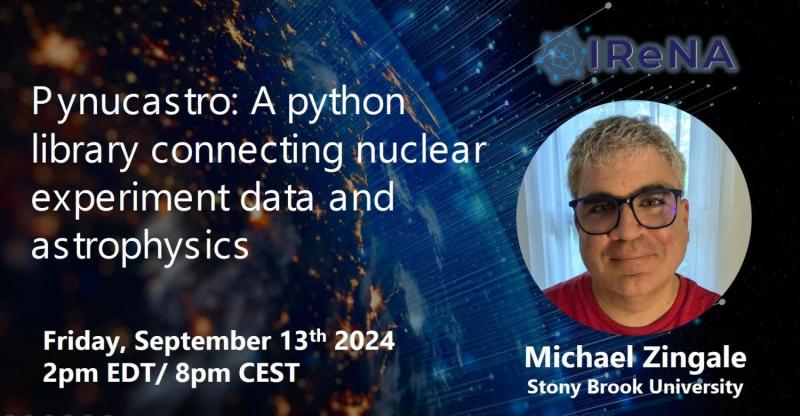Data
You will be redirected to cenamweb.org in 15 second(s). The JINA-CEE website is not updated anymore. The archived website can still be reached through the CeNAM website.
pynucastro: A python library connecting nuclear experiment data and astrophysics featuring Michael Zingale (Stony Brook University)

Hosted by: Avrajit Bandyopadhyay (University of Florida)
Abstract:
Sophisticated simulation codes have been developed to model stellar evolution and the explosive deaths of stars. For reacting stellar flows, up-to-date nuclear data needs to be made available in a form that can easily be compiled into simulation codes and work on today's modern GPU-accelerated supercomputers. Furthermore, we often want to be able to see how our simulations are sensitive to the details of the nuclear physics, so being able to generate reaction networks with different nuclei or rates quickly is important. To aid in this exploration, we've created a python library, pynucastro (https://pynucastro.github.io/pynucastro/), that can interface with nuclear data resources and allow for interactive exploration of rates and networks, as well as output C++ or python code corresponding to the righthand side of the system of ordinary differential equations that needs to be evolved to model the reactions. pynucastro can also derive reverse rates from detailed balance and compute nuclear statistical equilibrium states.
In this talk, we describe the features of pynucastro, including the libraries of rates it currently uses and discuss the ways that the community can help expand the rates and nuclear properties it provides. We also show how to export a network to be used with GPU acceleration in our simulation code, Castro. Example simulations of Type Ia supernovae, X-ray bursts, and massive star convection leading up to core-collapse will be shown. All of the code is fully open source and follows a community development model.
